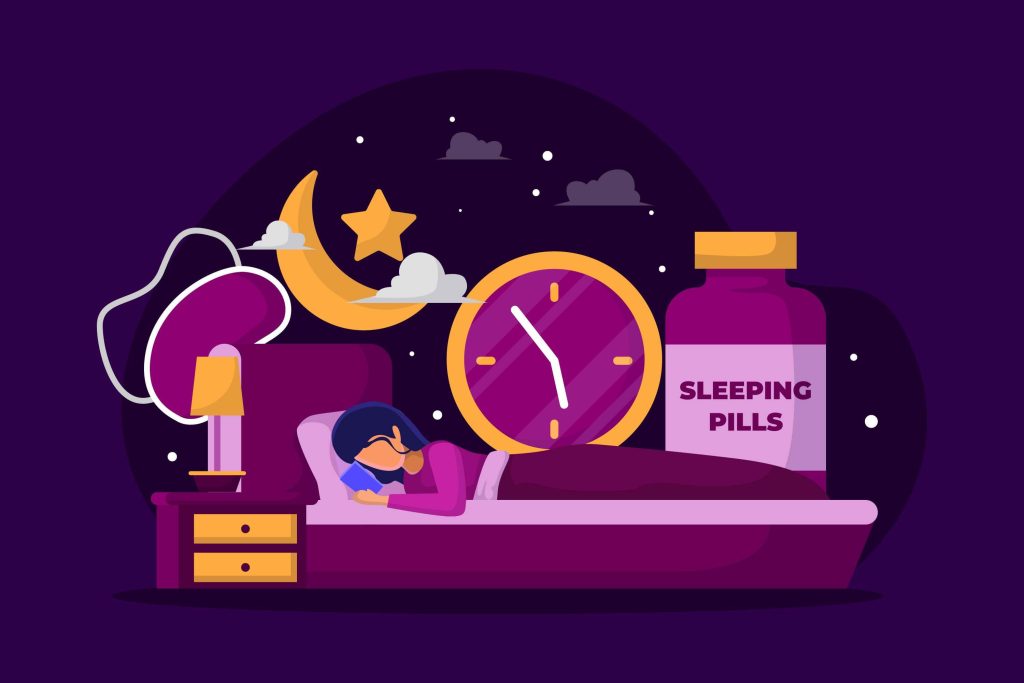What comes to mind when you hear the phrase, “The Science of Sleep”? The whimsical 2006 movie by Michel Gondry? Or perhaps something more…scientific? Whatever the case, it’s a fascinating world out there when you slumber and dreams aren’t the only things happening. It turns out that your brain and body throw a pretty wild party while you ‘snooze’ and understanding how this works can be a game-changer for your health, productivity, and overall well-being. So let’s consider the science of sleep.
Why Should You Even Care About the Science of Sleep?
I know, I know, science can sound a bit dry. But trust me, understanding the science of sleep can change a lot. It’s not just about figuring out how to get more shut-eye (though that’s a perk). It’s about unlocking the secrets of how sleep affects your mood, memory, creativity, focus, and even your waistline. So, whether you like sleeping (or not) buckle up and let’s go on this journey together.
What Happens in Your Brain When You Sleep?

Well, it’s not just resting, that’s for sure. Your brain is hard at work, keeping up a symphony of activity that’s essential for your well-being. Here’s what a breakdown of your brain’s nightly performance will look like.
- Non-REM Sleep: This is where the real heavy lifting happens. During non-REM sleep, your brain waves slow down, and your body gets busy repairing tissues, building muscle, and strengthening your immune system. It’s like your body’s little pit crew, getting you in tip-top shape for the next day. But it’s not just physical repair; non-REM sleep is also crucial for consolidating memories, transferring information from short-term to long-term storage, and preparing your brain for optimal learning and cognitive function the next day.
- REM Sleep: This is the dreamland stage, where your brainwaves become more active and your eyes dart around under your eyelids. While scientists are still unraveling the mysteries of dreams, they believe this stage is vital for emotional processing, creativity, and problem-solving. Think of it as your brain’s way of sorting through the day’s events, making sense of your emotions, and sparking new ideas. In fact, some of history’s greatest inventions and works of art have been inspired by dreams.
- Sleep Cycles: Throughout the night, you cycle through these different stages multiple times, each playing a crucial role in your overall health. The first few cycles are dominated by deep, restorative non-REM sleep, while REM sleep becomes more prominent towards the morning. This constantly changing cycle is essential for physical and mental rejuvenation. Understanding your sleep cycles can help you optimize your sleep schedule and wake up feeling refreshed.
The Consequences of Skipping Sleep

Another aspect of the science of sleep you need to be aware of is what happens when you don’t get enough sleep. It’s not pretty, folks. Sleep deprivation can mess with your mood, making you irritable, anxious, or even depressed. It can also impair your memory, attention, and decision-making skills, making it harder to focus and be productive.
In fact, research has shown that even a single night of sleep deprivation can significantly impact your ability to concentrate and perform complex tasks. If you’re struggling with focus and concentration after a poor night’s sleep, check out our post on 7 Simple Strategies to Reduce Attention Residue and Improve Focus
But the consequences of sleep deprivation go beyond just feeling groggy and unfocused. Chronic sleep loss has been linked to a wide range of health problems, including;
- Weakened Immune System: Your body’s defence mechanisms become compromised, making you more susceptible to illness. This is because sleep plays a crucial role in the production and regulation of immune cells.
- Increased Risk of Chronic Diseases: Sleep deprivation has been associated with an increased risk of heart disease, stroke, diabetes, and obesity. This is partly due to the disruption of hormones that regulate appetite and metabolism.
- Mood Disorders: Long-term sleep problems can contribute to the development or worsening of mood disorders like anxiety and depression. This is likely due to the impact of sleep on brain chemicals that regulate mood.
- Impaired Judgment and Risk-Taking Behavior: Sleep deprivation can cloud your judgment and increase your likelihood of engaging in risky behaviours. This is because sleep is essential for maintaining cognitive control and decision-making abilities.
The Takeaway: Sleep is Your Superpower
Okay, enough doom and gloom. The good news is that prioritizing sleep can have a huge positive impact on your life. Getting enough quality sleep can improve your mood, boost your creativity, sharpen your focus, strengthen your immune system, and reduce your risk of chronic diseases. So, consider this your permission slip to hit the snooze button (within reason, of course). Your brain and body will thank you for it!
Stay tuned for our next post in this series, where we’ll explore the fascinating connection between sleep and productivity.


